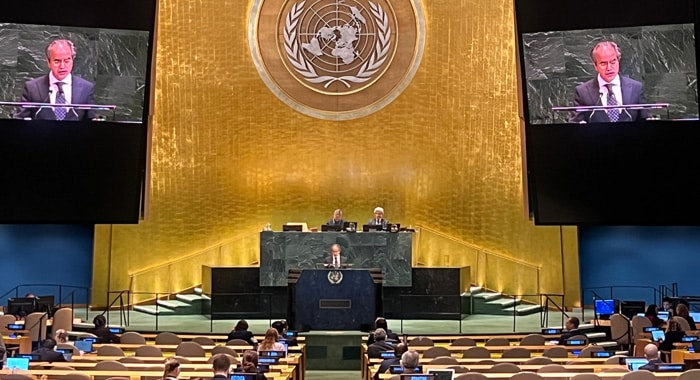Pakistan has issued a stark warning to the United Nations, revealing credible and documented evidence of an escalating alliance between outlawed terrorist outfits including the Tehrik-e-Taliban Pakistan (TTP), Balochistan Liberation Army (BLA), and the Majid Brigade who, it says, are operating with growing coordination from Afghan soil to target Pakistan’s strategic infrastructure and development corridors.
The warning, delivered by Pakistan’s Permanent Representative to the United Nations, Ambassador Munir Akram, comes amid a sharp spike in terrorist attacks across Pakistan in recent weeks. Addressing the UN General Assembly, Ambassador Akram stated that these groups are leveraging ungoverned spaces inside Afghanistan to orchestrate increasingly deadly attacks on Pakistani territory.
“This nexus of terror, with cross-border sanctuaries, has emerged as a direct threat to Pakistan’s security, regional peace, and global counterterrorism efforts,” he said. Ambassador Akram’s remarks follow two major terrorist incidents in the span of a few days. On June 28, a suicide bomber rammed an explosives-laden vehicle into a military convoy in North Waziristan, martyring 16 soldiers and injuring numerous civilians. Days later, five senior officials, including an Assistant Commissioner, were killed in a roadside bomb explosion in Bajaur.
He emphasized that sophisticated weaponry and equipment originally left behind by international forces during their 2021 withdrawal from Afghanistan are now being used by terrorist groups to launch attacks against Pakistan. “These weapons are not just a regional concern but a global one, as they enable transnational terror networks to operate with enhanced lethality,” he added.
According to the ambassador, the TTP alone maintains a force of approximately 6,000 fighters and remains the largest UN-listed terrorist group currently operating out of Afghanistan. He warned that its resurgence represents a “clear and present danger” not only to Pakistan but to regional and international stability.
Ambassador Akram also cited the presence of other extremist entities operating from Afghanistan, including ISIS-Khorasan, Al-Qaeda, and a range of Baloch separatist groups. He urged the United Nations and regional stakeholders to take urgent, coordinated action to dismantle these terror networks before they further destabilize the region.
“We must ensure that Afghanistan does not once again become a launchpad for terrorism,” he said. “The international community has a shared responsibility to act before these elements reignite another cycle of violence and undermine years of hard-won progress.”
Pakistan’s intervention at the UN underscores growing frustration with the unchecked rise of cross-border militancy and calls renewed attention to the need for a robust international response to prevent Afghanistan’s relapse into a safe haven for global terror.





